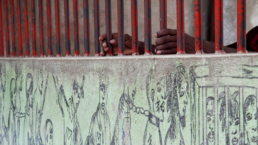Black detainees in Haiti face inhumane, torturous conditions without clear avenues for release.
by Rebecca Chowdhury, Prism
Patrick Julney was first detained by Immigration and Customs Enforcement (ICE) in 2019. He had been living in the U.S. since he was a young child attending high school in New Jersey, where he played on the football team and fell in love with Laura Julney, who was a cheerleader at the time. They married in 2021.
Now, they interact over glitchy WhatsApp calls. Julney was deported to Haiti in July, where he faced four months of detention at Haiti’s National Penitentiary. Julney and advocates say his deportation was a reprisal for speaking out against conditions in ICE detention centers. As a Black Muslim, Julney witnessed how anti-Blackness undergirds the immigration and criminal legal system and experienced the power and difficulties of organizing to abolish this system. Facing abysmal conditions in the National Penitentiary, Julney feared for his life until he was released on Oct. 24. He is now living with family friends in Haiti and trying to piece his life together.

Haitian authorities didn’t charge Julney with any crime in Haiti, yet the country has a longstanding illegal practice of detaining deportees who were formerly incarcerated in the U.S. Julney says there were approximately 30 other detainees from the U.S. in the penitentiary even though, according to Haitian law, it is illegal to detain deportees from the U.S., regardless of their criminal history.
During one of his interviews with Prism, while held in the penitentiary, Julney had to shout to be heard over a cacophony of voices in an overcrowded jail cell prior to his release.
Recent Posts
The Rage Of Billionaires And The Frenzy To Stop Zohran Mamdani From Becoming New York’s Mayor
June 30, 2025
Take Action Now The constellation of forces now regrouping with a vengeance includes titans of Wall Street, enormous real estate interests,…
It’s Not Just The Cities. Extreme Heat Is A Growing Threat To Rural America.
June 28, 2025
Take Action Now The urban heat island sits in a rural heat ocean.By Umair Irfan, Vox Summer has officially begun with a blast of scorching…
Mamdani’s Massive Victory Should Show Democrats Where The Party’s Future Lies
June 27, 2025
Take Action Now NYC mayoral candidate Zohran Mamdani has thrown the drowning Democratic Party a life vest. Will its leaders use it?By Sam…
India Walton’s Advice For Zohran Mamdani
June 26, 2025
Take Action Now “I think that for him, the race ’til November needs to be staying on message—we can’t start to water it down…




